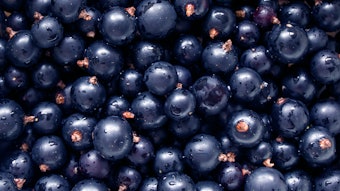
Ozempic, a semaglutide injection designed for adults with type 2 diabetes, has become an internet sensation due to celebrities utilizing it as a weight loss drug. Research by The Capitol Groupa shows a decline in food consumption by Ozempic users.
Read this article in the March 2024 issue!
The research article states, "The media frenzy around weight loss drugs reached a fever pitch when Walmart’s U.S. chief executive officer said that people on glucagon-like peptide-1 (GLP-1) weight loss drugs are buying less food compared to the general population."
What happens if this becomes a mass movement? What would food designed for an Ozempic world look like and what is the implication for flavor?
Perfumer & Flavorist+ tapped Bell Flavors and Fragrances principal flavorist Cyndie Lipka, ADM president of Creation, Design & Development and chief global flavorist Marie Wright and ADM senior director of Global Product Marketing, Flavors, Jennifer Zhou to weigh in.
If people eat almost 20% fewer snacks, will they spend more on the ones they buy?
Jennifer Zhou [JZ]: Consumer behaviors are already trending towards premiumization in health-forward eating. Weight-conscious consumers’ willingness to spend on weight-loss solutions will heavily depend on their income, and access and desire to purchase healthy food and drink options. Food and beverage manufacturers are expected to prove and deliver value to consumers, including cost, functional benefits, portion sizes, sensory experience and more.
Marie Wright [MW]: Much is still unknown about the long-term effects of weight-loss drugs, although consumers taking them have been shown to reduce their intake of offerings like baked goods and salty snacks. Even with a suppressed appetite, these consumers might spend more on healthier snacks and products with added functionality. This aligns with current health and wellness trends, although we can’t know for sure if people will be willing to spend more.
What happens if this becomes a mass movement?
Cyndie Lipka [CL]: I’ve been watching this trend. The United States population has always been quick to jump on trends especially if little is required on their part. We embrace that magic pill as if we are not accountable for our actions. Ozempic was developed for people with type 2 diabetes. As a result, they have lost weight. It is an injection meant to be taken long-term and when halted, you will likely gain back that weight. However, some physicians are prescribing this for use as a weight loss tool. Sadly, there are instances where those who need this for their diabetes treatment have come up short.
Wegovy was developed by the same company for use as a weight loss tool and contains twice as much of the active semaglutide. However, this one is not covered by insurance. Imagine which one people ask for. Over time the body gets used to both medications and dosages will need to increase over time as the body acclimates to it to still be effective for weight loss. I have seen one article say that semaglutide users are also taking other drugs to combat the side effects such as nausea and diarrhea.
JZ: It is still too early to tell how extensively they will impact consumer behavior, or if they will fall out of favor like previous solutions, where results couldn’t be sustained without continued adherence to self-imposed lifestyle changes for both nutrition and physical exercise.
What would food designed for an Ozempic world look like?
MW: If the average person starts eating less, it stands to reason that the foods they want to eat would be the most delicious. To support overall wellness, these foods and beverages would also be high in protein, rich in fiber and include more wholesome ingredients. We would also see a greater focus on portion control, and perhaps solutions to ease digestion.
 Ozempic is a medicine for adults with type 2 diabetes that has recently been making headlines for its weight loss benefits.Adobe Stock
Ozempic is a medicine for adults with type 2 diabetes that has recently been making headlines for its weight loss benefits.Adobe Stock
What's the implication for flavor trends?
JZ: We could see flavor trends diverging in two directions. One direction would be to create more fresh and authentic flavors in the healthy formats that consumers would gravitate towards. Taste profiles could rely on consumers’ associations with various health positionings, banking on the innate links consumers make with certain flavors on certain aspects of well-being, such as citrus and immune support, ginger and digestive support or apple and heart health. Flavor modulation would be key to mask any potential functional ingredient off-notes that could take away from the overall experience, or to rebalance the full sugar, full-fat taste experience that consumers expect. On the flip side, there could be a strong desire for the taste experience of indulgence, but with more convenient product formats and lighter and smaller portions.
How might this Ozempic trend influence innovation?
CL: So, let’s think about snacks and the food industry. Information may be anecdotal at this point, but let’s say it’s not. If I were to think about flavor trends and innovations, I would imagine that people would miss the flavors/profiles they have come to know and love. It would stand to reason that they would still want those profiles in non-snack forms. So, the indulgent profiles in protein and good-for-you foods that we see now would expand. Or, I can imagine a Doritos-crusted burger (beef, lab-grown or vegan). But will people miss the crunch they associate with the chips? Because face it, there is more than just taste going on here. My personal opinion is that this will peak and then pass.
If there is one thing, I am confident in is that our food industry to be innovative and resilient to the flighty public!
MW: We anticipate a growing focus on technologies that can create foods higher in nutrient value and that taste great. Consumers will continue to want a positive eating experience, and taste will play a larger role in food and beverage development in this space.
Footnote
ahttps://www.capitalgroup.com/advisor/insights/articles/weight-loss-drugs-could-reshape-industries-beyond-health-care.html?utm_shared_to=linkedin&utm_advocacy_source=es&utm_userID=c16a3fcc-95e6-4aec-9146-bd9b35eb0c19&es_id=9660dcda7b










